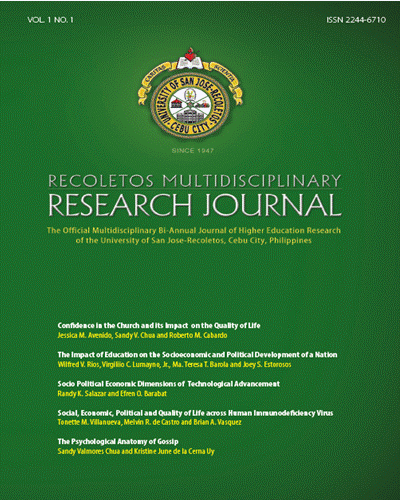Socio Political Economic Dimensions of Technological Advancement
DOI:
https://doi.org/10.32871/rmrj1301.01.03Keywords:
Technological advancementAbstract
The technological advancements of countries are varied, making the competition essentially uneven. Different studies had been made using a variety of determinants with the common objective of proposing theories on how to advance the technological capability of a country. This paper intends to look into the social, political and economic dimensions of countries that exemplify different degree of technological advancements, and determine how these factors affect the advancements. To derive the characteristics, data mining and multivariate clustering method were used. Technologically advanced countries demonstrate social and political characteristics that promote these advancements.
References
Fazel, S. (2003). Advances in Technology and Global Welfare, Journal for Economic Educators, 4:1.
Han, J. and Kamber, M. (2006). Data Mining: Concepts and Techniques 2nd ed, San Francisco, CA: Elsevier Inc.
Human Development Report 2009, Overcoming Barriers: Human mobility and development. New York, NY: United Nations Development
Program pp. 171-204,
J. D. Sachs and J.W. McArthur (2002). Technological Advancement and Long-Term Economic Growth in Asia. In Bai Bai, C.E. and Yuen, C.W.
(Eds.), Technology and the new economy (pp 157 – 185) MIT Press Cambridge, MA, USA.
Solow, M. (1957). The Review of Economics and Statistics: Technical Change and the Aggregate Production Function, JSTOR, 39:3, 312-320.
Tan, P.N., Steinbach, M. and Kumar, V. (2005). Cluster Analysis, Introduction to Data Mining, Boston, Ma: Addison-Wesley.
Thearling, K. (n.d.). Data Mining and Customer Relationships, What is data mining? Top 100 Engineering Universities in the World
2012.
World Bank (2008). Global Economic Prospects: Technology Diffusion in the Developing World. Washington: World Bank.
World Intellectual Property Organization, World Patent Report 2008, Switzerland.
Downloads
Published
How to Cite
Issue
Section
License
Copyright of the Journal belongs to the University of San Jose-Recoletos


